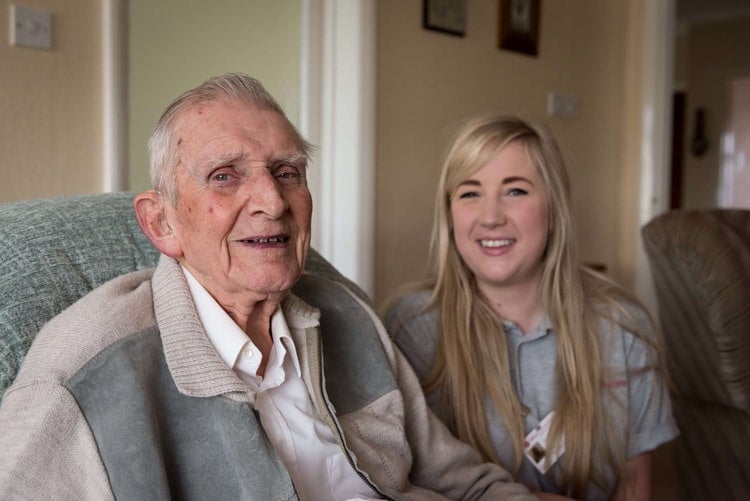Elderly paranoia: what is it and how to get help
Elderly paranoia is a distressing and often challenging condition to deal with. If your elderly loved one is hallucinating, developing persistent fears or imagining worrying situations, they may be suffering from old age paranoia. Symptoms can range from believing you are being followed, that possessions have been stolen, or that there is an intruder in your home.
Of course, this can be incredibly distressing not just for the person with elderly paranoia, but also for their loved ones. This guide is designed to help answer common questions about this mental health condition as well as offer guidance about the help available.
If you suspect that your elderly loved one is suffering from any signs or symptoms of elderly paranoia, it’s important to consult with your healthcare professional to get expert advice as soon as possible.
If you need some support so your loved one can continue living at home with old age paranoid, our Home Care Teams can help. Our Carers can provide a reassuring presence, regular respite for primary caregivers, or more physical help such as elderly sitting at night. To get started, find your local Alina Homecare Team today.
Jump to…

What is elderly paranoia?
Elderly paranoia is a symptom of a wider mental health condition known as ‘psychosis’. It can be described as a person’s unfounded belief that other people mean them harm, which happens when their mental processing is disconnected from reality. For example, an elderly person might worry that someone is stealing from them, or that one of their longstanding friends wants to hurt them without any basis.
As a result, paranoia in older adults is incredibly serious. It can cause side effects like anxiety, stress and depression. It may also cause an elderly person to act out and cause physical harm to others. Unfortunately, older adults are more susceptible to developing paranoia. Experts estimate that as many as 16-23% of older people develop psychosis.1 As many as 30% of people with dementia experience hallucinations and delusions.2
Fortunately, elderly paranoia can be managed with care and support. This includes our Home Care services, where a friendly and professional Carer can provide physical assistance as well as emotional and mental reassurance.
Many people often swap the terms paranoia, delusions and hallucinations as if they mean the same thing when referring to psychosis. However, there are differences between paranoia and hallucinations and paranoia and delusions in the elderly. In many cases, someone could experience paranoia, delusions and hallucinations all at once. This is especially true in people with Alzheimer’s or other forms of dementia.
What are some symptoms of elderly paranoia?
Firstly, it’s important to note that the fears and concerns expressed by elderly people may not be unfounded. Older people are a particularly vulnerable group within society, so any concerns raised should always be treated seriously.
That said, there are some key signs and symptoms of paranoia to look out for in older adults. Ask yourself if your elderly loved one suffers from:
Is paranoia a symptom of dementia?
Dementia progressively damages the brain and therefore affects every aspect of life, including how we perceive reality. Dementia and paranoia in the elderly often go hand in hand.
All types of dementia can therefore cause delusions and paranoia, but certain types are more likely to cause it than others. This includes Lewy Body’s dementia as well as frontotemporal dementia. These conditions cause behaviour changes, lack of insight into behaviour and other symptoms that may result in paranoia.5
What are some examples of paranoid behaviour in elderly people?
What is the cause of paranoia in older adults?
Unfortunately, there are many causes of paranoia in the elderly. These are often split into six ‘Ds’:
Delirium is a very common mental health condition. It can be triggered due to stress, severe illness, surgery or a stay in hospital. If your loved one has delirium, they may be quiet and withdrawn or on the other hand, extremely agitated and confused.
Episodes of confusion can be accompanied by paranoid delusions and hallucinations. One sign of delirium is when an elderly person picks at invisible objects on their clothes or bed.
Medication often comes with side effects and sometimes these may cause delusions, hallucinations and other types of psychosis. Abuse of drugs and alcohol can also have a similar effect. If you think your elderly loved one has paranoia triggered by medication, it’s very important to speak with their trained healthcare professional.
Physical health often interferes with mental and brain functions. Electrolytes, such as the amount of sodium, potassium, calcium or magnesium in our blood can affect the brain. So can vitamin deficiencies or issues like folate and thyroid problems or severe liver or kidney dysfunction.
In addition to this, there are various infections and neurological conditions which might cause paranoia in older adults. Finally, minor strokes may trigger psychosis symptoms as they can cause brain damage, as do brain tumours.
Can a urinary tract infection (UTI) cause paranoia in elderly people?
UTIs can indeed cause psychosis. If a urinary tract infection isn’t treated fast enough, bacteria from the urinary tract can move into the bladder and kidneys and cause an infection. In older people, this may cause sudden confusion, agitation and even accelerate dementia.
Again, it’s important to seek help from a trained healthcare professional like your NHS GP if you think your elderly loved one has a condition like a UTI that may be causing paranoia.
A lot of people with major depression can experience psychotic symptoms.6
Dementia is a common condition in elderly people. Over 940,000 people are currently living with dementia in the UK.7 Delusions are also common, such as believing someone is stealing from them, a spouse has been unfaithful or is abandoning them, or that they’re being persecuted. Hallucinations are also common, especially if they have Lewy Body dementia.
If an elderly person suffers from paranoia and psychosis, doctors may investigate whether they have schizophrenia or a delusional disorder. Schizophrenia is not particularly common in older adults. It affects an estimated 0.1-0.5% of people over age 65.
Many are diagnosed earlier in life but late onset schizophrenia is possible. According to the NHS, risk factors for developing this are: female gender, social isolation and sensory impairments (sight, hearing).3
What are the impacts of elderly paranoia?
There are a range of impacts that elderly paranoia brings, which ultimately can decrease the quality of life of the person experiencing it. It can make people feel scared, isolated and like no one understands them. Here are some of the impacts that someone with elderly paranoia may experience:
How do you deal with an elderly parent with paranoia?
If you know someone experiencing elderly paranoia, it can be emotionally distressing and even draining both for you and for them. It can be hard to know whether to play along with a delusion or whether to challenge it. Here are some tips and advice you can apply to navigate the challenges you face:
Are there treatment options for seniors with paranoia? When should I seek medical assistance for elderly paranoia?
Fortunately, many people with paranoia in old age can be treated for their condition. The first step when you suspect your loved one is paranoid is to visit their GP and explain the symptoms.
This might be difficult initially if your loved one is suspicious and they may accuse you of having bad motives. If this is the case, ring the GP initially and discuss your loved one’s symptoms over the phone. They can work with you to agree a way forward.
Depending on the symptoms of paranoid behaviour, doctors will explore different treatment options. This could include therapy, as well as medications like antidepressants or antipsychotics.
How can Home Care help with managing paranoia in older adults?
If your loved one is experiencing symptoms of elderly paranoia, it may be time to consider additional help. Help varies according to their needs, as well as yours.
For example, if you are their primary caregiver, you may choose to arrange Respite Care. This involves hiring professional Carers so that you can have a regular break away from the home. This is essential, especially when your loved one suffers from paranoia, as caregiving can be challenging and stressful. Our Carers visit your home to provide as much or as little help as you need, ensuring continuous care is maintained and you have peace of mind while you rest and recover.
If you need more regular care, there is a range of other care options available:
Visiting Home Care is available for as little or as much as you require. A Carer visits your elderly loved one’s home and can provide reassurance as well as practical help. This could involve anything from making meals or accompanying with your elderly loved one to helping them use the bathroom and getting ready for bed.
We offer a specific Dementia Care service, where our Carers can provide reassurance and provide a calming and reassuring presence if your loved one exhibits paranoid behaviour. Our Carers are always friendly and work hard to diffuse situations where a client may become irritable or aggressive.
Our Dementia Care service is provided by Carers in the comfort and familiarity of the home. They will help your loved one with their needs so they can live as independently as possible for as long as possible.
As dementia or psychosis develops, your elderly loved one’s care needs will increase. Live-in Care involves a Carer moving into the home to provide support throughout the day and night. This means you have round the clock reassurance, which is especially helpful if your elderly loved one is irritable or suffers from hallucinations during the night.
Our Carers can help pacify your loved one and discern between their genuine concerns and their paranoid beliefs. Our care is focused on maintaining dignity and always delivered with compassion.
Elderly paranoia can result in your loved one wandering about at night or even leave their home. This is obviously a dangerous and worrisome possibility and one that can be addressed by arranging a Waking Nights service.
With Waking Nights, one of our Carers stays awake through the night to watch your elderly loved one. They can help with using the bathroom in the late and early hours of the day, as well as providing reassurance if your loved one wakes up agitated from their sleep.
References
1. National Library of Medicine, “Treating Psychotic Symptoms in Elderly Patients“, Reviewed 18 September 2024
2. Alzheimer’s Association, “The incidence of dementia -related psychosis in people with dementia: Results from a survey of 302 U.S healthcare providers“, Reviewed 18 September 2024
3. NHS, “Mental Health in Older People: A Practice Primer“, Reviewed 18 September 2024
4. Pub Med, “Clinical issues in behavioural and psychological symptoms of dementia“, Reviewed 18 September 2024
5. National Library of Medicine, “Frontotemporal Lobe Dementia“, Reviewed 18 September 2024
6. NHS, “Psychotic depression“, Reviewed 18 September 2024
7. NHS, “What is dementia“, Reviewed 18 September 2024

